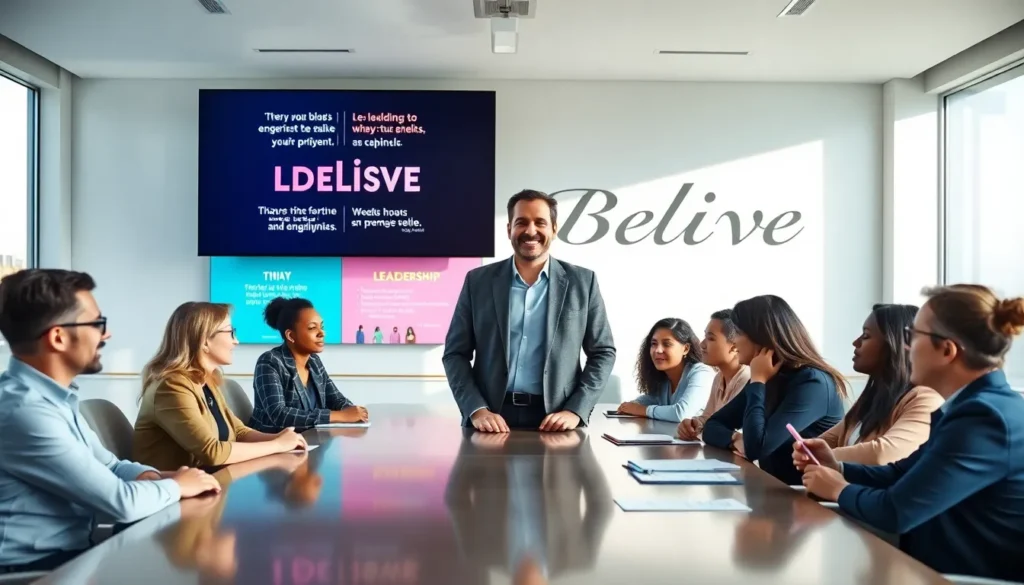Table of Contents
ToggleTed Lasso, the cheerful American football coach in a British soccer league, has surprisingly become an emblem of modern leadership. Who would have thought that a show centering around the misadventures of a clueless coach could offer profound insights into leadership? Packed with humor and heart, Ted Lasso dissects the nuances of empathy, communication, and optimism in ways that resonate deeply in our everyday lives and workplaces. Let’s jump into the leadership lessons sprinkled throughout this beloved series. You might find yourself inspired, maybe to lead a team, or simply to tackle the next awkward conversation with a newfound sense of confidence.
The Importance of Empathy in Leadership

Empathy is often touted as a cornerstone of effective leadership, and nowhere is this more apparent than in Ted Lasso’s approach. Ted consistently demonstrates that understanding his team members as individuals is more crucial than any tactical game plan. He listens actively, validates their feelings, and even shows up at unexpected moments to lend support. This type of empathy fosters a culture where team members feel valued not just for what they contribute, but as people. When leaders prioritize empathy, they create an environment that not only draws out the best in their teams but cultivates loyalty and open communication. In a world where the bottom line often reigns supreme, Ted’s ability to lead with his heart offers a refreshing counter-narrative.
Consider this: when team members believe their voices matter, engagement skyrockets. It’s a simple yet powerful lesson that Ted illustrates time and again.
Building a Positive Team Culture
Creating a positive team culture is another key facet of Ted’s leadership style. He transforms the often cutthroat atmosphere of a sports team into one that emphasizes cooperation and camaraderie. How does he do this? By highlighting the importance of connection over competition, Ted encourages his players to build each other up rather than tear each other down.
He regularly engages in team bonding activities, whether that be a casual game of darts or a heartfelt chat over tea. Each moment becomes an opportunity for team members to understand one another in a personal light. In doing so, he not only enhances their relationship but also cultivates mutual respect and trust. A positive team culture isn’t just good for morale: it leads to increased productivity and creativity.
By prioritizing teamwork and positivity, Ted lays the groundwork for exceptional performance and resilience under pressure, proving that a happy team is often a successful one.
Embracing Vulnerability as a Strength
One of the standout aspects of Ted Lasso’s leadership is his unapologetic embrace of vulnerability. Unlike traditional leadership models that often emphasize stoicism, Ted shows his team that being open and vulnerable is not a weakness, it’s a strength. He isn’t afraid to share his own challenges, fears, and even failures. This honest approach creates a safe space for others to do the same.
When leaders show their human side, it encourages those around them to do likewise. Vulnerability fosters authenticity among team members, promoting deeper connections. Ted’s ability to open up allows individuals to bring their whole selves to work, creating a culture where everyone feels secure to express themselves without fear of judgment. This is particularly vital in high-pressure environments, where emotional well-being can easily take a backseat to performance metrics.
By embracing vulnerability, Ted encourages resilience, creativity, and synergy, a dynamic that rocks the status quo.
The Power of Optimism and Encouragement
Optimism might seem like an oversimplified leadership trait, but Ted Lasso turns it into a tangible strength. He consistently radiates positivity even in challenging circumstances, ensuring that his team remains motivated and focused. His famous phrase, “Believe,” emblazoned above the entrance to the locker room, serves as a daily reminder of the power of a positive mindset.
Encouragement, a key pillar of his coaching style, spurs players to step outside their comfort zones and take risks. By consistently reinforcing belief in their abilities, he lifts their spirits, inspiring them to tackle challenges head-on. Studies indicate that an optimistic work environment promotes innovation and enhances overall job satisfaction. Ted’s unwavering belief in his team showcases how powerful encouragement can be in elevating both individual and collective performance.
In today’s often cynical world, leaders who practice optimism create waves of inspiration that ripple throughout their organizations.
Leading with Authenticity and Integrity
Ted Lasso embodies authenticity and integrity in every interaction he has. His leadership is grounded in being true to himself. He doesn’t mask his personality to fit the mold of what those around him expect. Instead, he leads by example, showing that genuine leaders can affect real change through authenticity. Integrity shines through when he stands by his values, even when faced with adversity.
Building trust is paramount in leadership, and Ted understands this completely. By treating others with respect and honesty, he fosters a transparent environment where team members feel safe to express their ideas and concerns. His willingness to admit mistakes also speaks volumes: it reinforces the idea that vulnerability and authenticity strengthen leadership. Authentic leaders tend to inspire deeper loyalty, as team members feel they are being led by someone who truly understands them and their needs.
Fostering Growth and Learning Opportunities
A critical aspect of Ted Lasso’s leadership is his commitment to fostering growth and learning among his team. He encourages players to view challenges as growth opportunities rather than setbacks. By emphasizing learning and development, Ted creates an environment where experimentation is encouraged. This approach allows team members to make mistakes without the fear of criticism, transforming failures into stepping stones for success.
He provides resources, mentorship, and constructive feedback to help his players grow. Growth isn’t just about individual performance: it extends to the team’s ability to adapt and improve collectively. A team that embraces continuous learning becomes more agile, innovative, and capable of overcoming obstacles. Ted’s dedication to growth shows that great leadership invests in people, championing their progress while nurturing a culture of curiosity.





